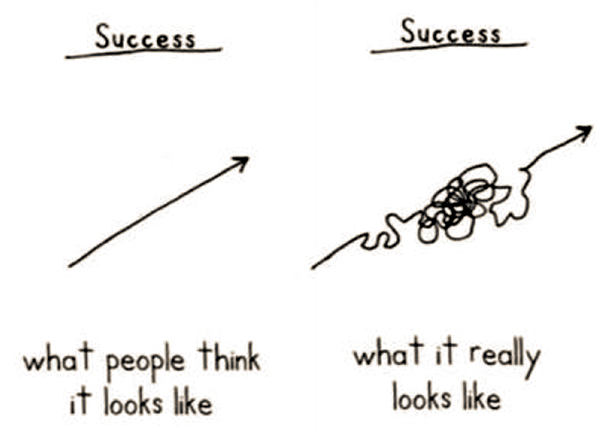 Sport isn’t math.
Sport isn’t math.
People often think about development in sports as something akin to a mathematical equation. Something along the lines of the following (though in different people’s mind the specifics might be slightly different):
- A = hours cross training
- B = private lessons
- C = getting the right equipment
- A+B+C= FENCING CHAMPION
But that’s not really the way that fencing works, or in fact the way that any sport works. What actually happens with sports is that the journey is very much individual in nature, and it’s not exactly a straight line for nearly anyone. Progress forward in sport can’t be seen as an overly analytical venture, it’s got to be viewed much more through the lens that an artist might see their work through. Could you look at a painting by Picasso and figure out its worth based on an equation?
Adding up your fencing progress
Small steps = big progress is about not measuring the outcome of every training. Trying to somehow create a tally from each and every training session just isn’t going to give you an accurate idea about where you’re going or where you’ve come from. With sports, you cannot expect to always improve and achieve more than yesterday – that kind of view is much too small and shortsighted to be effective. In our training, it’s common and even helpful to reach a plateau, then to fall down and step back up again.
Guess what – that’s not just how progress happens in fencing, it’s how progress happens in LIFE. There’s no such thing as a straight, uphill line between where you are and where you want to be. There’s always a curve that goes up, a learning process that starts in one place and moves upwards through a whole mess of issues.
The special case of young fencers and progress
This is an issue that can be an especially big one for kids, who don’t have the life experience to see past what’s right in front of them. It’s just a reality that they haven’t had to face just yet in their young lives! That’s why it’s so important for parents to realize that their kids are going to get frustrated with their fencing progress at times. They’re going to feel as though they’re putting in so much work for very little reward. They’re going to feel like they’re so frustrated with their small steps that they can’t see the big progress and want to give up. That’s why it’s so, so important for parents to have the foresight to see the progress that’s on the horizon and to support kids through those tough times of not making adequate progress.
If your child lost today, it doesn’t make it the time to say that there’s something wrong with their fencing training, with their fencing coach, with the child themselves, or with their fencing, teammates. A loss can come about for any one of a thousand different reasons, most of which are totally out of the control of the individual, no matter how great their club or teacher is. There isn’t anyone who ALWAYS wins – even world and Olympic champions have terrible tournaments and even terrible whole seasons. The point is that no matter how much they might fail, they always get back up and keep going.
If anything, it’s those fencers who are the most persistent who end up catapulting to higher levels of success. Getting knocked back is just part of growing and learning.
The journey of the fencer
Fencing is a journey, one that’s on a road that is completely unidirectional. Sometimes there will be bumps on the road, sometimes even roadblocks. The trick to finding success is to never stop trying, even when it feels like everything is going against you.
A big way that parents can support their kids is to recognize the winding nature of the fencing journey and to support them through that. The best way to offer support is NOT TO ASK them every day what they learned in fencing. It’s a sport, and so sometimes you’re not going to learn anything new. Most of the time you’re just going to refine the techniques you’ve been working on, training them into muscle memory so that they can be executed without a second thought. Or just ploughing through some challenging techniques again and again, waiting for the light bulb to finally go off inside your head. Sometimes it will even be the opposite, with a fencer having to step back and to “unlearn” the bad habits in order to allow them to restructure from a basic level. Sometimes you need to take step back to clear the path forward.
The value of practice is not in the immediate moment right after it happens, but rather in the long game of big progress that we see in our fencing. The journey of fencing doesn’t rely on everyday progress! Redefining the way that we understand learning and success is integral to digging in and making that forward motion to get to where you’re going.
There are no straight lines of progress in fencing – becoming great at it is a winding, murky road that’s impossible to chart. Don’t try to draw a straight line! The more that you try to force your journey or your child’s journey into some neat equation or some straight line, the more disappointed you will be during this journey – allow it to be whatever it needs to be.
The moral of the story is: put down the calculator and enjoy fencing!
Image credit: Roy Pumphrey



Leave a Reply